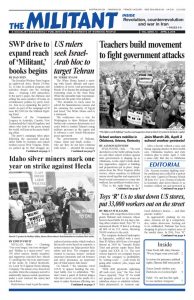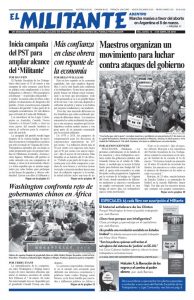The White House hosted a meeting with Israeli officials and representatives of seven Arab governments March 13 to discuss the prolonged and worsening crisis in the Gaza Strip. While the ostensible topic was humanitarian aid, the goals were political.
“The situation in Gaza must be solved for humanitarian reasons and for ensuring the security of Egypt and Israel,” the White House said in a statement.
The conference was a way for Washington to draw Mideast allies further into common discussions as it seeks both to combat Tehran’s rising military presence in the region and to advance a new Israeli-Palestinian peace agreement.
The governments of Bahrain, Oman, Qatar and Saudi Arabia — who say they do not have relations with Israel — attended the meeting. The Palestinian Authority boycotted. The governments of Egypt and Jordan and 20 other governments and organizations attended. Also present was the “Quartet,” officials from the U.S., Russia, the U.N. and EU who are tasked with “shepherding” negotiations between Israel and the Palestinians.
Washington’s attempts over decades to secure an agreement between the Israeli rulers and Palestinian organizations that will also accommodate the interests of U.S. imperialism have so far been unsuccessful. The administration of President Donald Trump seeks to organize Arab rulers — who require Washington to combat their rival Tehran’s growing clout — to press Palestinian officials to reach an agreement with Israel. The White House statement made no mention of the blockade the Israeli and Egyptian rulers impose on the entry of many basic necessities into the Gaza Strip. This exacerbates the impact of the shortages 2 million Palestinians face there following years of destructive wars. Half the population of Gaza relies on aid to survive and just under half are unemployed.
Hamas, the Tehran-funded Islamist group that has controlled Gaza since 2007, calls for the destruction of Israel, promotes Jew-hatred and has fought three wars with Israel over the last decade. The deadly cycle of Hamas terror attacks and Israeli retaliation have made life hell for the toilers in Gaza.
A statement released Dec. 11, 2017, by the Socialist Workers Party National Committee says it’s “a political necessity for the Israeli and Arab governments and leaderships of Palestinian organizations to begin immediate talks to recognize both Israel and an independent Palestinian state. Negotiations to reach such an agreement must recognize the right of Jews everywhere to take refuge in Israel in face of the global rise of Jew-hatred and anti-Semitic violence, as well as the unconditional right of the dispossessed Palestinian people to a contiguous, sovereign homeland on territory — including East Jerusalem — conquered and occupied by the Israeli government during the 1967 war.”
The long drawn-out antagonism between the capitalist rulers in Israel and Iran has sharpened as Tehran has moved to extend its counterrevolutionary reach, joining Moscow in helping the Bashar al-Assad dictatorship regain its grip in Syria. In doing so, Tehran, and its allies, Hezbollah and other Shiite militias, have occupied territory close to Israel. Like their Hamas allies, the Iranian rulers call for the destruction of Israel.
The U.S. rulers are determined to push back Tehran’s expanding sway and also counter Moscow’s rising influence in the region. They seek to end the rift between Sunni-Muslim U.S. allies in the Middle East, to unite them against Tehran. The Saudi monarchy accuse the Qatari government of getting too close to Tehran. President Trump says he will meet with the leaders of these nations in coming weeks.
Saudi Foreign Minister Adel al-Jubeir backed Washington’s efforts to toughen the deal former President Barack Obama struck with Tehran aimed at slowing down the Iranian capitalist rulers’ nuclear weapons program. Washington wants to expand restrictions on Tehran’s ballistic missiles program and their ability to produce nuclear weapons.
Assault against Kurds in Afrin
After eight weeks of bombardment and invasion, the Turkish rulers March 18 dislodged the Kurdish People’s Protection Units (YPG) from the capital of Afrin, one of Syria’s Kurdish provinces. The assaults have dealt a blow to the Kurdish people’s struggle for national rights. More than 200,000 have fled Afrin.
The rulers of Iran, Iraq, Syria and Turkey have fought for decades to deny the 30 million Kurds who live in these countries a homeland. Kurds from elsewhere in Syria traveled to Afrin to aid the fight there, but Ankara prevailed, based on its air monopoly — granted by Moscow and Washington — and its superior firepower.

